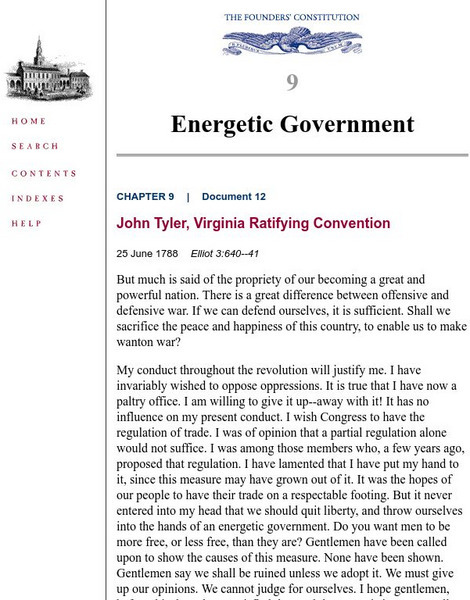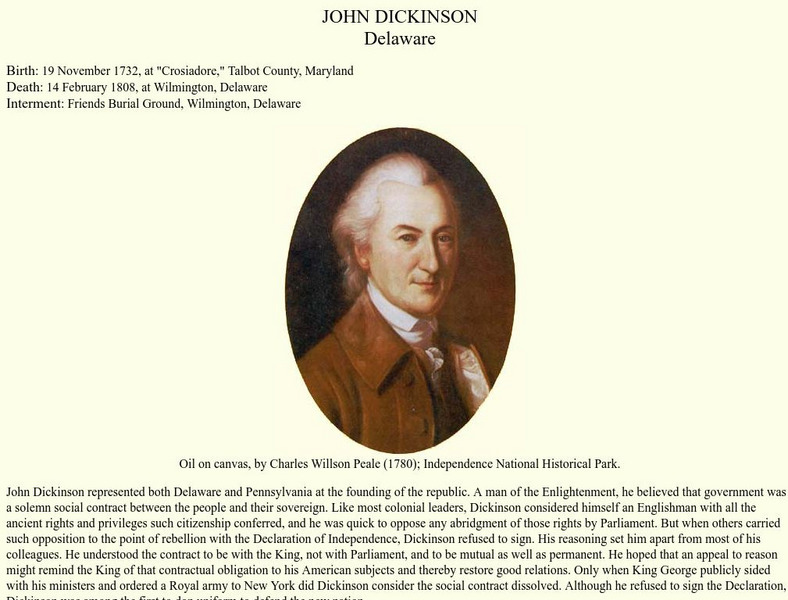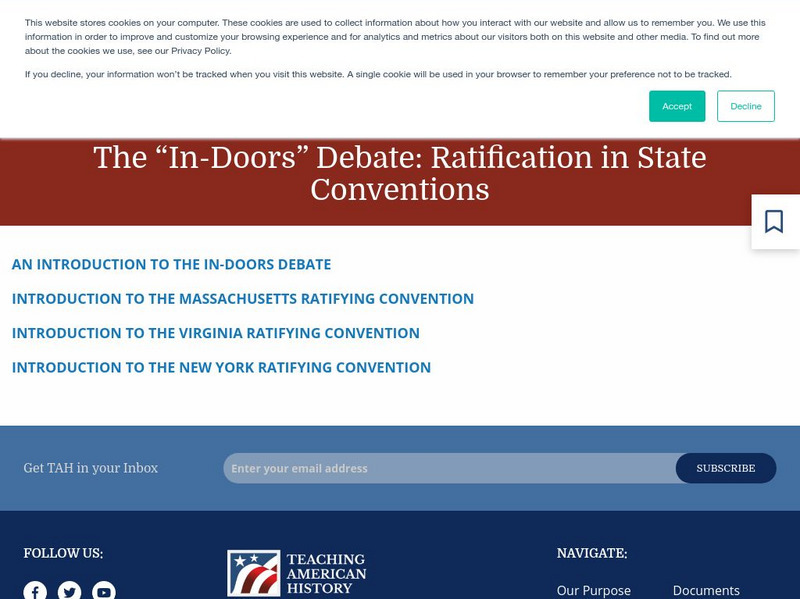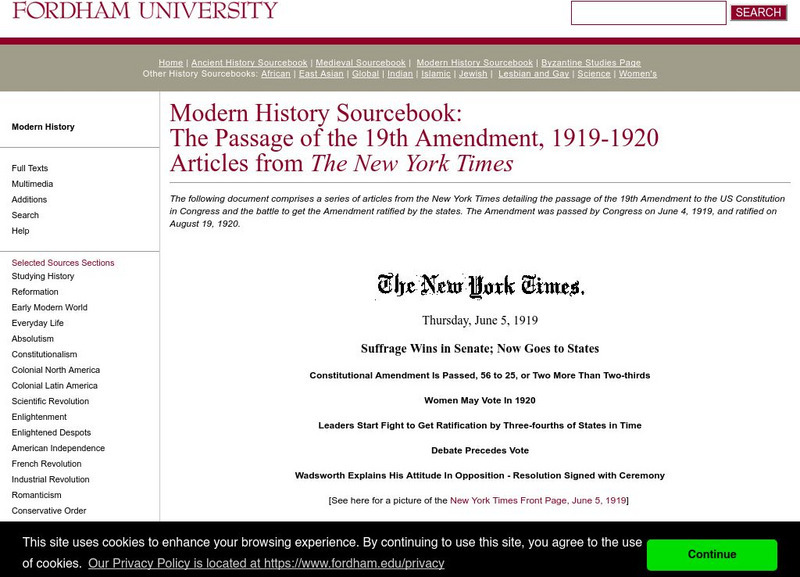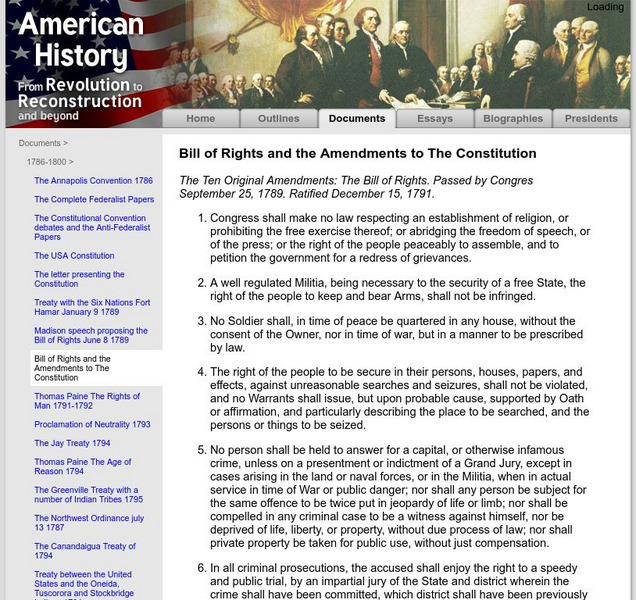Hi, what do you want to do?
Bill of Rights Institute
Bill of Rights Institute: Additional Amendments
The Constitution contains within itself the process of changing it. The amendment process is described in Article 5. Amendments can be proposed in Congress when 2/3rd of both Houses agree. The states can play a role in proposing changes...
University of Groningen
American History: Outlines: Ratification
This site from the University of Groningen provides a synopsis chronologically written on the ratification of the U.S. Constitution beginning with the first states who accepted the document to pressures exerted by the Federalists to...
Digital History
Digital History: Slavery and the Slave Trade [Pdf]
Read reconstructions of debates by delegates to the Constitutional Convention as they attempted to come to terms with slavery, the slave trade, and how to address the issue in the Constitution so all states would be willing to ratify it....
Quia
Quia: Hangman the Order of the 13 Original States
Play hangman while remembering the order of the thirteen original states. After reading the clue, simply click on the letters to begin revealing the answer.
Library of Congress
Loc: Primary Documents in American History: The Articles of Confederation
The original Articles of Confederation and Perpetual Union between thirteen states, created in 1777 and ratified in 1781. It preceded the Constitutional Convention in 1787.
US National Archives
National Archives: Congress Creates the Bill of Rights Iib
This is the 3rd section of a PDF entitled Congress Creates the Bill of Rights. This section focuses on the articles debated in Congress that eventually formed the Bill of Rights. Background on each article is given as well as a picture...
Khan Academy
Khan Academy: Us History: 1754 1800: The Federalist Papers
In the Federalist Papers, Alexander Hamilton, James Madison and John Jay made the case for ratifying the new US Constitution.
Success Link
Success Link: 1787 [Archived Version]
By using the novel, Shh! We're Writing the Constitution by Jean Fritz, and 1787 by Joan Anderson, learners learn the lively discussion among the delegates to the Constitutional Convention concerning the ratification of the document they...
iCivics
I Civics: Race to Ratify
This simulation game set in the 1780s focuses on the ratification of the Constitution.
C3 Teachers
C3 Teachers: u.s. History Module: Did Founders Want Government to Work? [Pdf]
A comprehensive learning module on the system of government established by the founders that includes three supporting questions accompanied by formative tasks and primary source materials, followed by a summative performance task....
US Department of State
Office of the Historian: Constitutional Convention and Ratification
Among the many weaknesses of the Articles of Confederation was the inability of the government to conduct foreign policy in an effective manner. Find out how the Constitutional Convention addressed this issue by allowing the Executive...
A&E Television
History.com: Native Americans Weren't Guaranteed the Right to Vote in Every State Until 1962
Native people won citizenship in 1924, but the struggle for voting rights stretched on much longer. Native Americans couldn't be U.S. citizens when the country ratified its Constitution in 1788, and wouldn't win the right to be for 136...
University of Chicago
The Founders' Constitution: John Tyler, Virginia Ratifying Convention
The original text of a statement by John Tyler, member of the Virginia Constitutional Ratifying Convention, on his opposition to the new Constitution.
Library of Congress
Loc: The Bill of Rights: Debating the Amendments
Help students grasp the idea of making amendments with this lesson on the debates of the amendments to the US Constitution. Use primary sources to have the students choose their own amendments, give them opportunity to analyze the...
US Army Center
U.s. Army Center of Military History: John Dickinson
A good biography of John Dickinson (1732-1808 CE). He was one of the delegates to the Constitutional Convention from Delaware. He was a strong supporter of the new Constitution and as a result, Delaware became the first state to ratify...
Khan Academy
Khan Academy: Us History: 1754 1800: The Bill of Rights
The first ten amendments to the US Constitution guarantee citizens' essential freedoms and rights.
A&E Television
History.com: Continental Congress
From 1774 to 1789, the Continental Congress served as the government of the 13 American colonies and later the United States. The First Continental Congress, which was comprised of delegates from the colonies, met in 1774 in reaction to...
Teaching American History
Teaching American History: "In Doors": Ratification in State Conventions
Strengthen understanding of the ratification of the Constitution. Study the state ratification conventions of Massachusetts, Virginia, and New York.
Teaching American History
Teaching American History: State by State Ratification Table
A chart illustrating the order of states as they ratified the new constitution. Find the delegates from the states, vote, population, and outcomes.
Digital History
Digital History: The Equal Rights Amendment
In 1972, Congress passed the Equal Rights Amendment (ERA) to the U.S. Constitution. The ERA subsequently failed to be ratified by the necessary number of states and was never added to the Constitution.
University of Chicago
The Founders' Constitution: Notes From Virginia Ratifying Convention
Edmund Randolph's notes taken at the state convention of Virginia on ratification of the new Constitution.
Internet History Sourcebooks Project
Fordham University: Modern History Sourcebook: Passage of the 19th Amendment
This site from the Modern History Sourcebook of Fordham University comprises a series of articles from the New York Times detailing the passage of the 19th Amendment to the U.S. Constitution in Congress and the battle to get the...
Other
Supreme Court Historical Society:texas v. Johnson (1989)
A complete unit on constitutional law that uses the court case of Texas vs. Johnson, in which Gregory Lee Johnson was convicted of desecration of a venerated object after lighting an American flag on fire. The case became an argument...
University of Groningen
American History: Documents: The 13th Amendment
An original 13th amendment restricting lawyers from serving in government that was supposedly ratified in 1819 and removed from the U.S. Constitution during the Civil War.






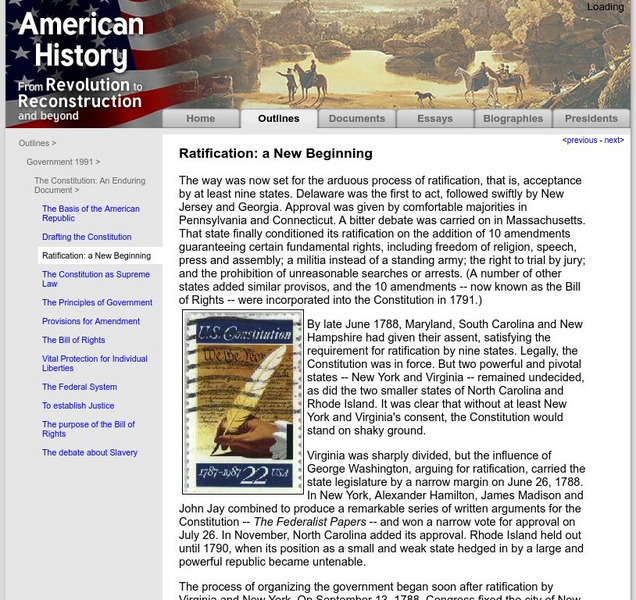
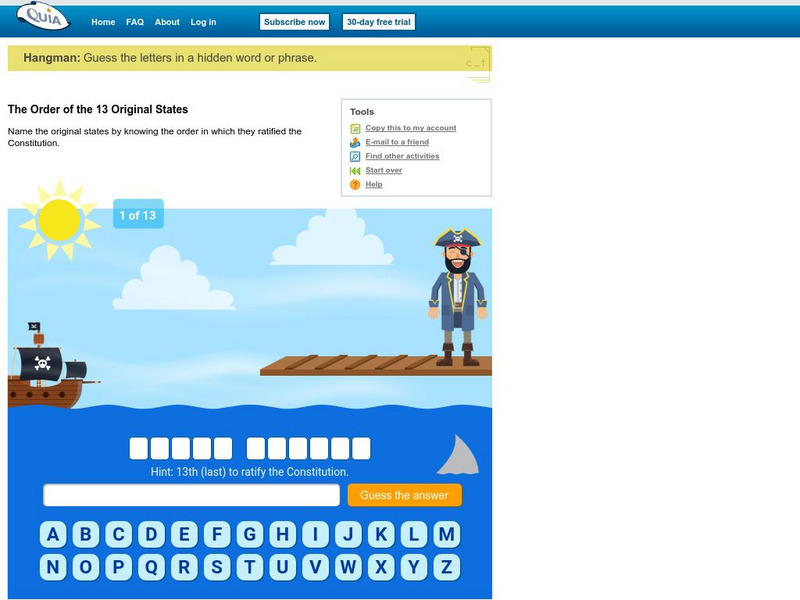
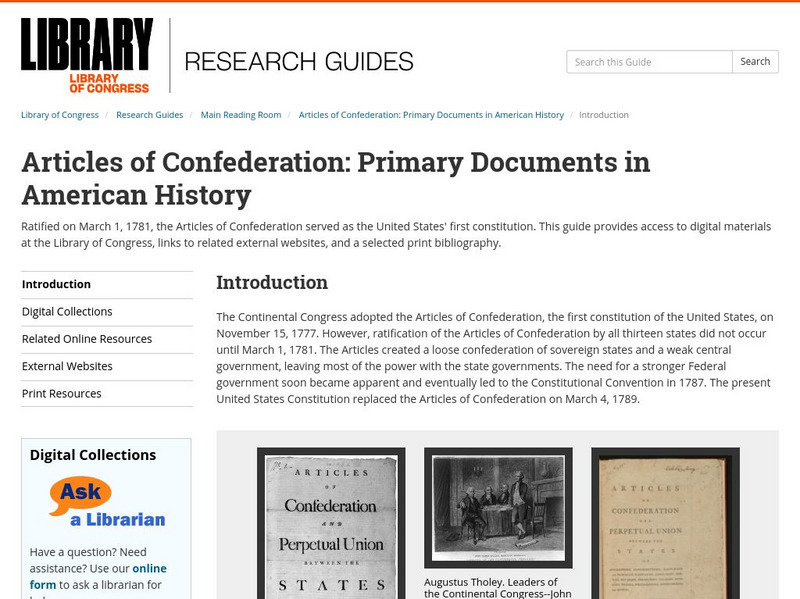

![Success Link: 1787 [Archived Version] Lesson Plan Success Link: 1787 [Archived Version] Lesson Plan](https://content.lessonplanet.com/knovation/original/501064-ffae068b782fcb5a01d3c7ce2e1a5a66.jpg?1661827526)


